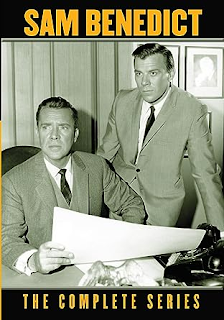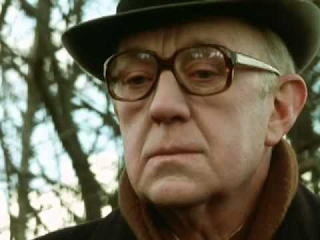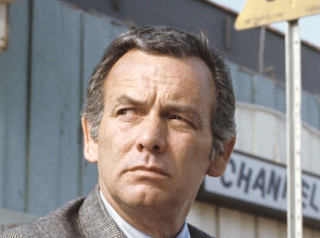 |
| David Janssen and Anthony Zerbe, stars of Harry O and a very mismatched couple |
The following is part of The Mismatched Couples Blogathon, running this weekend at many of your favorite blogs. Be
sure to check the sponsors, Cinematic
Catharsis and Realweegiemidget,
throughout the weekend for the latest posts. "Around the Dial" will
return next Friday—same time, same channel.
Somewhere in the dusty archives housing the history of television, there must be a playbook on private detective shows that states the P.I. must always have a love-hate relationship with a foil in the police department: someone who can be counted on to grumble about how our hero is always meddling in his cases, holding out on information he's discovered, and operating just outside the law. Nevertheless, said foil can always be counted on to come through in the clutch, showing up just in time to save the detective's bacon—or, more often, to slap the cuffs on the bad guys just after our hero has single-handedly subdued them with his gun, his fists, or both. Case solved, they can go out together afterward for a beer (or two). It's a dependable formula, responsible for more than one hit action series over the years. Of these relationships, one of the most unique is that between private detective Harry Orwell and detective lieutenant K.C. Trench of the Santa Monica Police Department. By any definition, they can be considered one of television's mismatched couples.
l l l
David Janssen enjoyed an enviable career in television. He starred in two hit series in which he played iconic characters—Richard Diamond, Private Detective and The Fugitive—and he guested in a plethora of dramatic series and made-for-TV movies. (His movie career wasn't bad either, although he never attained the success he hoped for.) He was an intelligent and skilled actor, popular with viewers, and was capable of making a show better than it should have been simply by his presence. He died much too soon, at age 48, in 1980. But before then, he had one last memorable role up his sleeve—that of private detective Harry Orwell in the series Harry O.
Orwell was a former detective on the San Diego police department; he'd retired after having been shot in the back, and when the series premiered in September 1974, he was working out of his beachfront home as a private detective. For inside information, he relied on Lieutenant Manny Quinlan (Henry Darrow), and while Orwell could occasionally try Quinlan's patience, their relationship was based on a personal friendship, as well as respect between former colleagues who'd solved many cases together.
However, halfway through that first season, the series underwent a retooling. Harry had found himself in Santa Monica on a case, and following the case's resolution, had decided to stick around. Naturally, he needed a new foil, in the form of Lieutenant K.C. Trench, played by Anthony Zerbe. Zerbe was one of television's better-known character actors, appearing in virtually every dramatic series of the 1960s and 1970s, usually as some type of greasy heavy. Harry O was his first co-starring role in a television series, and he made the most of it, winning an Emmy in 1976 for Best Supporting Actor in a Drama Series. He shines in the role, and the relationship between Orwell and Trench will become the highlight of the remainder of the series.
Orwell runs afoul of Trench fairly early in the going, in the episode "For the Love of Money." Like most police investigators, Trench doesn't particularly appreciate interference by private detectives, especially when he thinks they're holding out on him. "You know I'm about to book you as an accessory, Orwell," Trench says in that first exchange. "Accessory to what?" Orwell replies. "Don't play dumb," Trench snaps. "I'm not playing dumb," Harry says. "That's the real me, coming through."
But Trench takes the time to check out Orwell's background, and he knows that Harry was a good detective on the force, and is likely a good detective in private practice as well." At the end of that first case, Trench concedes this. "I like the way you operate, Orwell. Like a cop. Who knows? Maybe we'll get along. Just don't ever keep anything from me." Famous last words, right?
However, it's the second season opener, "Anatomy of a Frame," that sheds the most light on Trench and helps explain his relationship with Orwell. In this story, Trench is framed for the murder of an informer, and with nowhere else to turn, he comes to Harry for help. "The only person available to whom I can unburden my soul is a middle aged beach bum of somewhat questionable repute," he explains to Harry, who replies, "You have a problem." Orwell has no doubts as to the lieutenant's innocence: "Trench, you have tunnel vision about your work. By your own admission, you do not drink in public, you do not socialize with the other members of the department. You're a snob, you're opinionated, and what's worse, you're usually right." But Harry knows that Trench is an honest cop, not a murderer. And Trench knows that Orwell is good; furthermore, he trusts him in a case that may be the most important in the lieutenant's life.
(Orwell is able to clear Trench, of course, for which Trench is sincerely thankful. But when he extends his had to shake Harry's, Harry instead hands him a crumpled piece of paper: his bill. The bill itself doesn't bother Trench; I think he would have been offended had it been otherwise—that's not the way Trench does business. But it's just a handwritten mess, sloppy, difficult to read. "Has it occurred to you to get a typewriter?" Trench asks, stuffing the bill in Harry's coat pocket. "I expect things to be done in a businesslike manner. That's why I hired you, Orwell.")
Over time, the two become something approaching frenemies, with Harry casually strolling into Trench's office whenever he feels like it, something that drives the lieutenant crazy. ("Orwell, I do not appreciate it when people walk into my office without knocking," he tells him, at which point Harry steps back out of the office, closes the door, knocks, and walks in without waiting for an invitation.) Trench may find himself giving Orwell a new lead or a look at a file, often against his better judgment, in return for Harry's promise that he'll share with Trench whatever he finds out, a promise that Orwell may or may not keep. They frequently clash, such as when Orwell's convinced that Trench is after the wrong suspect, or Trench accuses Orwell of seeing clues that aren't really there. Their arguments can get heated at times. Seldom, however, is there a suggestion from one that the other doesn't know what he's doing. It's that mutual respect for the abilities and the integrity of each that binds the two and allows them to work together.
Still, that doesn't stop Trench from becoming irritated at Orwell's constant presence in an apparently open-and-shut case, or Harry's frustration that Trench doesn't see the connections that Harry does, connections that point to his client's innocence. At times, it seems to the long-suffering Trench that there's no escaping Harry. "At first, I thought it was just a bad dream; Orwell wasn't really all over this building, in every room and corridor that I pass," he says after running into Orwell in the pathologist's office. "It would be too much, even for a nightmare. But then I thought, 'Trench, maybe reality is really worse than a dream, maybe this apparition is indeed a fact.'" Turning to the pathologist and nodding in Trench's direction, Harry says, "He really likes me."
 |
| "Orwell, I do not want to see you around here again, do you understand?" |
l l l
Harry O ran on ABC from 1974 to 1976; it was, from the start, an unconventional detective series. For starters, Orwell walks around with a bullet still lodged in his back, a remnant of the shooting that forced his retirement from the force, which serves to restrict his mobility (although as the series progresses, the network's desire for action scenes necessitated a marked improvement in Harry's physical condition). There are also very few high-speed car chases, since Harry's beater of a car spends far more time in the repair shop than it does in his driveway, with the result that he spends a good amount of time riding the bus to meet his clients. Orwell's voiceover narrations were often noir-like, more closely resembling existential interior monologues than mere plot advancers.
All this means that the climax to a typical Harry O episode is far less likely to involve Harry shooting, beating up, running down, or otherwise physically incapacitating his prey than in other detective shows (i.e. The Rockford Files). It does mean that Lieutenant Trench is often on the scene, slapping the cuffs on the suspect, witnessing that Orwell's hunches have paid off once again. And while they're not apt to head off to the bar together for that celebratory beer, there is the satisfaction of a job well done.
For this reason, Harry O was never a ratings success in the same way as other, more action-oriented P.I. shows. It was different, though, and the critics looked upon it favorably. David Janssen poured himself into the role, and felt the series contained some of his best work; Anthony Zerbe, as I mentioned, won an Emmy for his performance as Trench. But in an effort to boost the ratings, the network couldn't help but meddle. The location was changed, the narration became more conventional, more action and gunplay was added, and Harry was given a proto-girlfriend in Farrah Fawcett-Majors. Ratings did improve, and had it not been for programming chief Fred Silverman and his preference for jiggle TV, it might have continued. But, alas, Harry O was out, and Charlie's Angels, complete with Farrah, was soon in. And so it goes.
Still, Harry O is an enjoyable series to watch, often good, occasionally better than that. But even its lesser episodes have something to offer that's worth watching, and that's the relationship between our hero: cynical, rumpled, wearing a sportscoat with a tie that's often askew and rarely pulled tight, and a crooked smile that tells you he's already seen more than most people; and his upright police foil: formal, precise in his language, always dressed in a three-piece suit, and likely with a bottomless supply of aspirin in a desk drawer. Harry O and Lieutenant Trench are among the oddest and most unlikely of couples, mismatched in every way except their desire for justice. They're proof that opposites do attract, and it's why Harry O is a series worth watching. TV




















